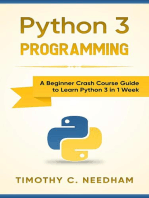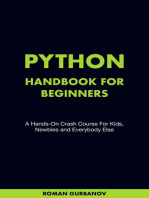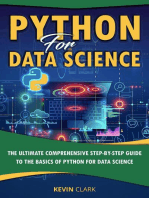0 ratings0% found this document useful (0 votes)
8 viewsAutomation With Python
Uploaded by
conagog433Copyright
© © All Rights Reserved
Available Formats
Download as PDF, TXT or read online on Scribd
0 ratings0% found this document useful (0 votes)
8 viewsAutomation With Python
Uploaded by
conagog433Copyright
© © All Rights Reserved
Available Formats
Download as PDF, TXT or read online on Scribd
You are on page 1/ 1
Automation with Python: Saving Time and Resources
One of Python's standout advantages is its ability to automate
repetitive tasks. With Python, you can write small scripts that
perform tasks automatically, saving time and resources.
For example, Python can be used to send automated emails, back
up files, manage folders and files on your computer, perform
automated data analysis, and more. Libraries like os and shutil
allow for working with the file system, while smtplib makes it
easy to send emails.
Python automation is also widely used in web scraping, where
data can be collected from websites automatically using libraries
like BeautifulSoup and Scrapy. These tools enable developers
to extract data from websites programmatically, such as for
market research or competitive analysis.
Using automation with Python can simplify daily tasks and
streamline processes at work, especially when dealing with
repetitive, monotonous tasks. The wide range of libraries and
tools makes Python a natural choice for both simple and complex
automation tasks.
You might also like
- Easy-To-Follow Tutorial To Learn Python Programming In Less Than One WeekFrom EverandEasy-To-Follow Tutorial To Learn Python Programming In Less Than One Week3/5 (6)
- Python: For Beginners A Crash Course Guide To Learn Python in 1 WeekFrom EverandPython: For Beginners A Crash Course Guide To Learn Python in 1 Week4/5 (25)
- Python Programming, Deep Learning: 3 Books in 1: A Complete Guide for Beginners, Python Coding for Ai, Neural Networks, & Machine Learning, Data Science/Analysis with Practical Exercises for LearnersFrom EverandPython Programming, Deep Learning: 3 Books in 1: A Complete Guide for Beginners, Python Coding for Ai, Neural Networks, & Machine Learning, Data Science/Analysis with Practical Exercises for Learners4/5 (4)
- Python Programming For Beginners: Learn The Basics Of Python Programming (Python Crash Course, Programming for Dummies)From EverandPython Programming For Beginners: Learn The Basics Of Python Programming (Python Crash Course, Programming for Dummies)5/5 (1)
- Advanced Python Automation: Build Robust and Scalable ScriptsFrom EverandAdvanced Python Automation: Build Robust and Scalable ScriptsNo ratings yet
- Python Automation Tools To Turbocharge - Hayden Van Der PostNo ratings yetPython Automation Tools To Turbocharge - Hayden Van Der Post400 pages
- Learn Python Programming for Beginners: The Best Step-by-Step Guide for Coding with Python, Great for Kids and Adults. Includes Practical Exercises on Data Analysis, Machine Learning and More.From EverandLearn Python Programming for Beginners: The Best Step-by-Step Guide for Coding with Python, Great for Kids and Adults. Includes Practical Exercises on Data Analysis, Machine Learning and More.4/5 (2)
- Python Programming: The Ultimate Comprehensive Python Crash Course for Absolute Beginners – Learn How to Master Python Coding LanguageFrom EverandPython Programming: The Ultimate Comprehensive Python Crash Course for Absolute Beginners – Learn How to Master Python Coding LanguageNo ratings yet
- Python Automation for Beginners: A Practical Guide with ExamplesFrom EverandPython Automation for Beginners: A Practical Guide with ExamplesNo ratings yet
- LEARN PYTHON PROGRAMMING: A Comprehensive Guide for Beginners to Master Python Programming (2024)From EverandLEARN PYTHON PROGRAMMING: A Comprehensive Guide for Beginners to Master Python Programming (2024)No ratings yet
- Python for Engineers: Solving Real-World Technical ChallengesFrom EverandPython for Engineers: Solving Real-World Technical ChallengesNo ratings yet
- Practical Guide to Python: From Basics to Advanced ProgrammingFrom EverandPractical Guide to Python: From Basics to Advanced ProgrammingNo ratings yet
- Mastering Python: Learn Python Step-by-Step with Practical ProjectsFrom EverandMastering Python: Learn Python Step-by-Step with Practical ProjectsNo ratings yet
- Python Simplified: Learn Programming Through Practical ExamplesFrom EverandPython Simplified: Learn Programming Through Practical ExamplesNo ratings yet
- Python for Secret Agents - Volume II: Gather, analyze, and decode data to reveal hidden facts using Python, the perfect tool for all aspiring secret agentsFrom EverandPython for Secret Agents - Volume II: Gather, analyze, and decode data to reveal hidden facts using Python, the perfect tool for all aspiring secret agents4/5 (1)
- PYTHON FOR BEGINNERS: Master the Basics of Python Programming and Start Writing Your Own Code in No Time (2023 Guide for Beginners)From EverandPYTHON FOR BEGINNERS: Master the Basics of Python Programming and Start Writing Your Own Code in No Time (2023 Guide for Beginners)No ratings yet
- Python Programming For Beginners: Python Programming Language TutorialFrom EverandPython Programming For Beginners: Python Programming Language TutorialNo ratings yet
- Web Scraping with Python Step by Step: A Practical Guide with ExamplesFrom EverandWeb Scraping with Python Step by Step: A Practical Guide with ExamplesNo ratings yet
- Python Algorithms Step by Step: A Practical Guide with ExamplesFrom EverandPython Algorithms Step by Step: A Practical Guide with ExamplesNo ratings yet
- How Python Simplifies Industrial ProcessesNo ratings yetHow Python Simplifies Industrial Processes2 pages
- Python 3 Programming: A Beginner Crash Course Guide to Learn Python 3 in 1 WeekFrom EverandPython 3 Programming: A Beginner Crash Course Guide to Learn Python 3 in 1 Week3.5/5 (3)
- Python Handbook For Beginners. A Hands-On Crash Course For Kids, Newbies and Everybody ElseFrom EverandPython Handbook For Beginners. A Hands-On Crash Course For Kids, Newbies and Everybody ElseNo ratings yet
- The Best Python Programming Step-By-Step Beginners Guide Easily Master Software engineering with Machine Learning, Data Structures, Syntax, Django Object-Oriented Programming, and AI applicationFrom EverandThe Best Python Programming Step-By-Step Beginners Guide Easily Master Software engineering with Machine Learning, Data Structures, Syntax, Django Object-Oriented Programming, and AI applicationNo ratings yet
- Python for Beginners: The Dummies' Guide to Learn Python Programming. A Practical Reference with Exercises for Newbies and Advanced Developers: Python Programming, #1From EverandPython for Beginners: The Dummies' Guide to Learn Python Programming. A Practical Reference with Exercises for Newbies and Advanced Developers: Python Programming, #1No ratings yet
- A Python Guide for Web Scraping: Explore Python Tools, Web Scraping Techniques, and How to Automata Data for Industrial Applications (English Edition)From EverandA Python Guide for Web Scraping: Explore Python Tools, Web Scraping Techniques, and How to Automata Data for Industrial Applications (English Edition)No ratings yet
- Enterprise Automation with Python: Automate Excel, Web, Documents, Emails, and Various Workloads with Easy-to-code Python ScriptsFrom EverandEnterprise Automation with Python: Automate Excel, Web, Documents, Emails, and Various Workloads with Easy-to-code Python ScriptsNo ratings yet
- PYTHON FOR BEGINNERS: A Comprehensive Guide to Learning Python Programming from Scratch (2023)From EverandPYTHON FOR BEGINNERS: A Comprehensive Guide to Learning Python Programming from Scratch (2023)No ratings yet
- Python Automation - Tools To Turbocharge Your Efficiency by Hayden Van Der PostNo ratings yetPython Automation - Tools To Turbocharge Your Efficiency by Hayden Van Der Post400 pages
- Python In - Depth: Use Python Programming Features, Techniques, and Modules to Solve Everyday ProblemsFrom EverandPython In - Depth: Use Python Programming Features, Techniques, and Modules to Solve Everyday ProblemsNo ratings yet
- Mastering Python Scientific Computing: A complete guide for Python programmers to master scientific computing using Python APIs and toolsFrom EverandMastering Python Scientific Computing: A complete guide for Python programmers to master scientific computing using Python APIs and tools4/5 (1)
- Python Programming for Kids: Fun and Easy Guide to Building Your First ProgramsFrom EverandPython Programming for Kids: Fun and Easy Guide to Building Your First ProgramsNo ratings yet



























































